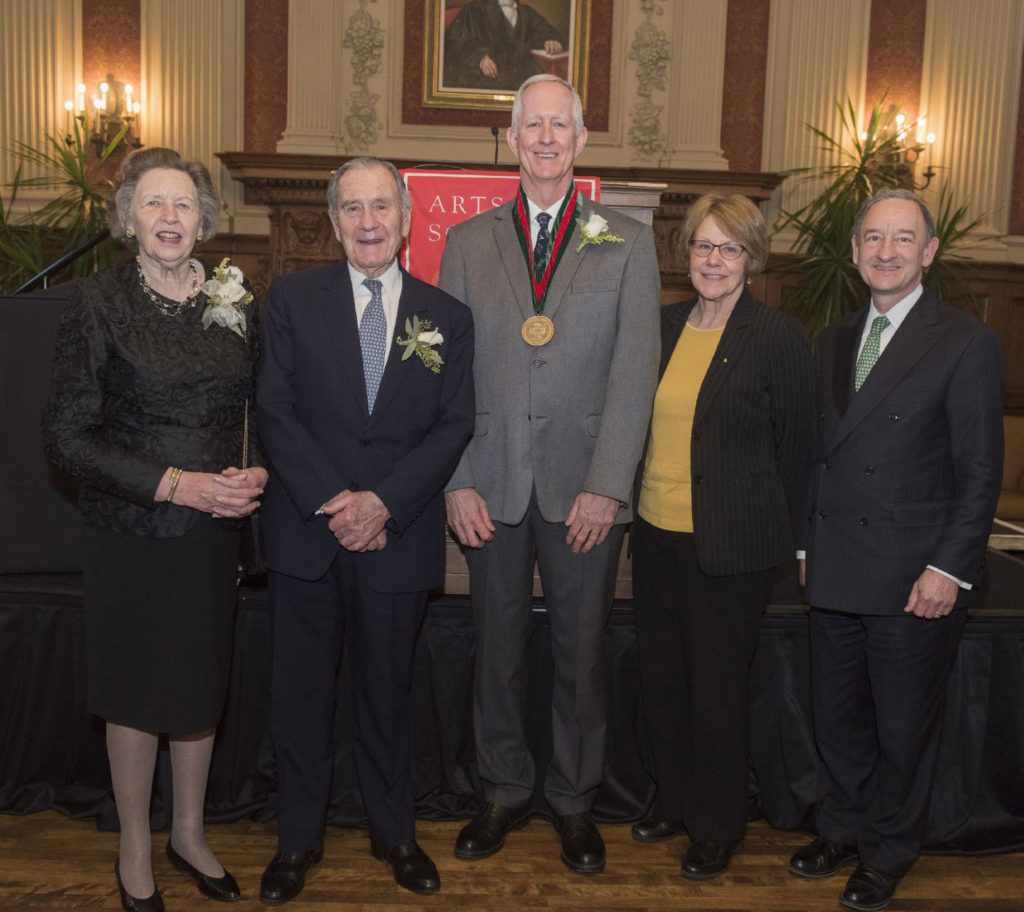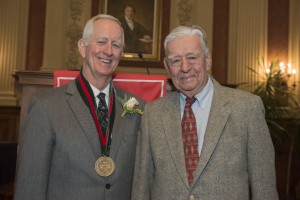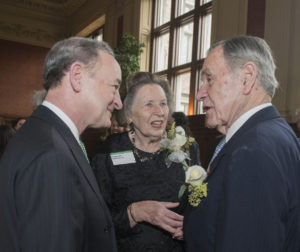
Richard D. Vierstra was installed as the inaugural holder of the George and Charmaine Mallinckrodt Professorship at a ceremony held March 7 in Holmes Lounge at Washington University in St. Louis.
George and Charmaine Mallinckrodt established the professorship in 2013 with a gift of $2 million. The professorship resides in Arts & Sciences and is designated for the field of plant biology, an area of great strength, and even greater potential, at Washington University.
Vierstra, one of the world’s leaders in plant science, joined Washington University in 2015 after 30 years at the University of Wisconsin-Madison, where he had unraveled the secrets of plant pathways that destroy unwanted proteins and allow plants to sense daylight, so that they know when to germinate and flower.
“In seeking a holder for the George and Charmaine Mallinckrodt Professorship, we searched aggressively in collaboration with the Donald Danforth Plant Science Center leadership to identify a global leader, a person who would help us build our region-wide initiative in plant science,” said Chancellor Mark S. Wrighton. “I am so glad we were able to appoint Richard Vierstra to this important professorship, and am deeply grateful to George and Charmaine Mallinckrodt for their generous support that has made this possible. Their professorship will have a lasting impact on the field of plant biology and the work of our faculty.”
Vierstra was introduced by Barbara Schaal, dean of the Faculty of Arts & Sciences and the Mary-Dell Chilton Distinguished Professor. Schaal, herself a prominent plant biologist, summarized Vierstra’s research for the audience, saying he “brings great distinction to the university and to the Department of Biology. It’s hard to imagine anyone who would be more fitting to serve as the inaugural George and Charmaine Mallinckrodt Professor.”
Vierstra’s lab group is interested in the control of processes that regulate growth, Schaal said. Scientists have long known that the creation of proteins is crucial for most, if not all, aspects of plant biology, but only recently have they begun to understand that protein destruction is equally important.

Vierstra’s lab studies the ubiquitin-26S proteasome system, the main pathway for protein destruction in animals and plants. Ubiquitin marks proteins for destruction and 26S proteasome snips them in pieces, releasing the ubiquitin for reuse.
Another major area of research for the Vierstra lab is phytochrome, a light-sensing pigment found in the leaves of most plants that allows them to detect the time of day and the season. Vierstra’s postdoctoral study of phytochrome led to the purification and characterization of this photoreceptor.
The Vierstra lab has continued to make discoveries about the biochemistry of phytochrome, discoveries that have opened the door to engineering these light-sensing molecules for agronomic and medical benefit.
Vierstra earned a bachelor’s degree in biology and chemistry from the University of Connecticut, and his doctorate in plant biology from the Department of Energy’s Plant Research Laboratory at Michigan State University.
After a postdoctoral appointment at the University of Wisconsin, he joined the faculty there and later became a full professor. In 1993, he spent a sabbatical as a Fulbright Scholar at the University of Melbourne, Australia, and, in 2011, he was appointed the Stanley J. Peloquin Professor in the Department of Genetics at the University of Wisconsin.
Throughout his career at Wisconsin, Vierstra won many awards for outstanding research and teaching. Outside the university, he has served at the International Society for Plant Molecular Biology and the American Society for Plant Biology.
In 2014, he was listed by Thomson Reuters in the top 1 percent of researchers in plant and animal sciences worldwide, based on citation impact.
He has also been a member of the editorial boards of several scientific journals, participated in review panels for federal science funding agencies, and organized international scientific meetings related to his research. In 2002, he was elected as a fellow of the American Association for the Advancement of Science.
About Charmaine and George W. Mallinckrodt
George and Charmaine Mallinckrodt chose to establish and endow a professorship in the plant sciences because they recognize that plant biology is vital to feeding the billions of people in the world while also safeguarding a sustainable environment.
George Mallinckrodt is president of Schroders plc, a global asset management firm that employs more than 3,700 people in 25 countries. A former chairman of the Council of the World Economic Forum, he serves as vice president of the German-British Chamber of Industry & Commerce and is president of the German YMCA.
Charmaine Mallinckrodt was born into a banking family and has traveled widely with her husband during his business career. Her lifelong dedication to philanthropy extends to environmental issues and support for the education of taxonomists at the Royal Botanic Gardens, Kew.
Over the years, George Mallinckrodt has received many honors for his service and generosity. In 1997, Queen Elizabeth II made him an honorary Knight Commander of the Most Excellent Order of the British Empire in recognition of his many years of outstanding service in banking and finance. Pope Benedict XVI bestowed on him a Papal Knighthood in recognition of his generosity to the Vatican Library, and the Freedom of the City of London was given to him in 2004. He also holds honorary degrees from Washington University and Bishop’s University in Quebec.
As a young man, Mallinckrodt was greatly influenced by the character and generosity of his cousin, the late philanthropist Edward Mallinckrodt Jr., who transformed Mallinckrodt Inc. from a small chemical producer in St. Louis to a major manufacturer of pharmaceutical products.

“Edward was himself passionate about the environment and preserving habitat and nature,” Charmaine Mallinckrodt said. “It was Edward who introduced George to Washington University. Over the years, Edward and Chancellor Emeritus Bill Danforth have inspired our interest and commitment to the institution.”
The couple traveled from their home in London, England, to Washington University to take part in the installation ceremony for the inaugural George and Charmaine Mallinckrodt Professor. They made a previous visit in spring 2011, when George Mallinckrodt was awarded an honorary doctor of laws degree at the university’s 150th commencement.
“We have the highest regard for Washington University, its academic standing, and the quality of its leaders and faculty members,” George Mallinckrodt said.
“We believe that partnerships, dissemination of knowledge and experience, and a global vision are key to addressing world problems.”